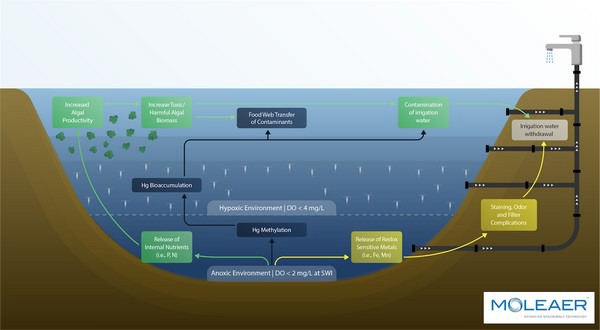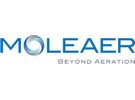Rainwater storage basins are a critical source of irrigation water for greenhouses and open field cultivation. In recent years, the European spring and summer seasons have been warmer and drier, decreasing water availability and increasing dependency on storage basins for open-field agriculture. To further these challenges, rising temperatures promote bacteria, fungi, and algae growth resulting in decreased basin water quality.
Moleaer’s Clear nanobubble generator offers a chemical-free, cost-efficient, sustainable solution to improve water quality and prevent algae growth in water storage basins. Maintaining storage basin water quality is comparable to surface waters such as ponds or lakes which Moleaer treats more than 75 ponds and lakes worldwide.
The quality of the water is in part determined by the refreshment rate, or how fast water enters and leaves the basin, as well as the nutrient load. When it rains, fresh water enters the basin as runoff from the greenhouse glass roofs. The rainwater also carries organic matter such as leaves and twigs which are deposited on the bottom of the basin and forms a sediment layer also commonly known as a muck layer.
Most basins lack sufficient natural oxygen to decompose the organic matter in the muck layer and therefore, the overall basin water quality suffers. Under low oxygen conditions, nitrogen and phosphate are released from the sediment, which creates conditions for algae to thrive. Further, the pH of the water increases and metals can be released as shown in the figure below. The poor water quality ultimately leads to water treatment challenges.

Nanobubble generators recirculate a stream of water and inject up to one billion oxygen-rich nanobubbles per milliliter. By adding nanobubbles and dissolved oxygen, an all-natural ecosystem is restored that digests the organic matter, removing the food source for algae and pathogens.
Further, when nanobubbles collapse, they generate a mild oxidation process that breaks down the organic sediment and reduces algae and pathogens, but is not harmful to higher-order organisms or plants. This makes it a sustainable and chemical-free treatment, unlike the common copper or hydrogen peroxide treatment methods.
Moleaer’s Clear nanobubble generators have already been deployed in the Netherlands for rainwater storage basin treatment. The Clear generator has been placed at a tomato grower basin for the treatment of the stored water, significantly improving water clarity and eliminating previous algae blooms.
As farmers continue to face challenges from climate change such as water shortages, sustainable solutions to preserve and improve water quality will become increasingly critical. Moleaer is committed to developing and deploying cost-efficient solutions that support the growth of chemical-free horticulture and agriculture, including with the Clear and Neo nanobubble generators.
For more information: Moleaer
Moleaer
[email protected]
moleaer.com










